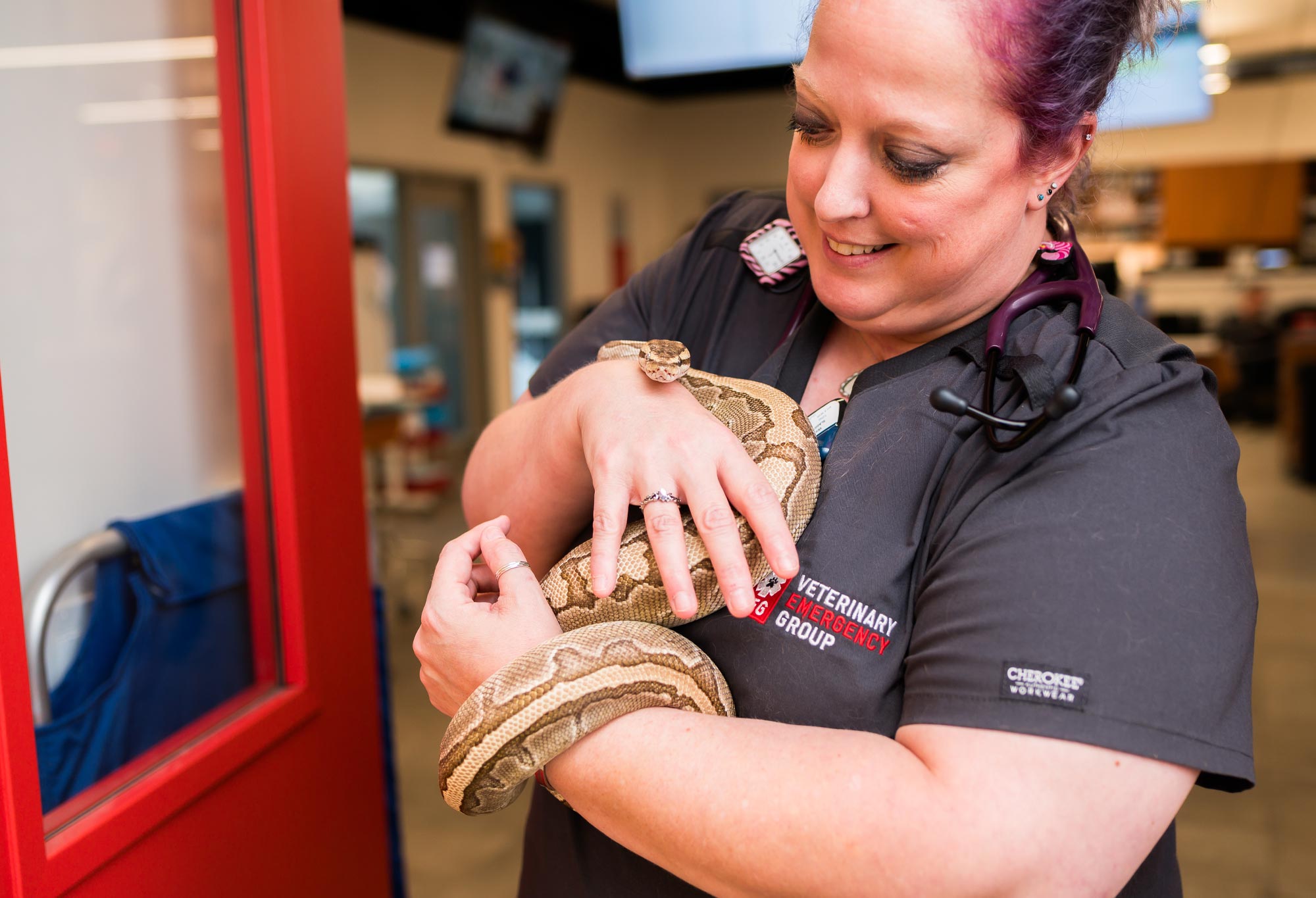
My Snake Isn’t Eating – Is it Serious?
Dr. Kelsey Bradley
Call & Speak with a doctor Open 24/7, Even Holidays!
Walk in today for:
Emergencies
Point-of-Care Ultrasound
Urgent Care
X-Rays
Diagnostics + Testing
End-of-Life Care
Surgery
Treatment + Hospitalization
Snakes, fascinating and mysterious, thrive with proper care. But just like any other pet, they can have their “off” days. Beware, your serpentine companion is rather good at hiding illness—making it tough to spot any abnormal behavior.
One of the most common signs of a health issue is when your pet decides to go on a hunger strike. Let’s try and uncoil some facts on why your snake isn’t eating.
COMMON REASONS WHY SNAKES WON’T EAT
1. PICKY EATERSSSSS
While some snakes are adaptable with their diet, others may only want what they typically eat in the wild. Here are a few pointers to help:
- Know their normal diet – Use a veterinarian-approved resource, such as Reptile Magazine to find the ideal diet for your snake
- Switch the prey item
- Color of prey (e.g., white to brown mice)
- Type of prey (e.g., mice instead of rat pup)
- Decrease stress
- Do not watch after placing the prey with your snake (even snakes need some me-time!)
- Do not handle just before/after eating
- Consider feeding in a separate feeding container
- Time of day – Many snakes are nocturnal hunters so feeding at night may help
Never feed a captive snake live prey unless the prey is totally incapable of biting and injuring the snake.
2. IMPROPER HABITAT CAN TIP THE SCALES
It’s essential that a snake’s environment (and diet) is as similar to their natural habitat as possible. Any environmental deficiency or imbalance could stress out your rad reptile, causing it to give meals a hard pass. Over time, this can lead to illness. Signs of disease are very slow to develop, often taking weeks and months to show. Look for decreased food intake, dehydration, and weight loss.
Snakes aren’t big fans of the cold and low humidity is especially hard on their respiratory system. Every reptile species has an ideal Preferred Optimal Temperature Zone (POTZ). The body system slows when a snake is below its POTZ.
Consider perches, hiding spots, or water mimicking nature to encourage normal eating behavior. Discuss specific needs of your snake with a reptile veterinarian, as prey, supplements, and husbandry requirements vary by species.
3. INFECTION – DETECTION & PROTECTION
Your snake may not want to admit this out loud, but they might have infectious stomatitis aka “mouth rot.” This may present as loss of appetite, weight loss, and crusts or bleeding from the mouth.
This infection is often caused by other problems and should be treated immediately. To best prevent snake mouth rot:
- Feed your snake with only dead, frozen then thawed prey. Live prey can put up a fight and scratch and injure your snake, leading to infection.
- Feed only appropriate-sized prey. If the prey is too big, your snake may not be able to consume it.
- Provide adequate temperature and humidity. This helps in keeping your snake’s immune system healthy.
4. SLITHERING INTO SHEDDING TIME
Ready for a makeover? Well, snakes certainly are…multiple times a year! They routinely shed their old skin for a shiny, new one. When this occurs, the skin takes on an opaque, or “blue” tone prior to actually starting to shed, and during this, you may find your snake does not want to eat. While it may be normal, keep an eye out for dysecdysis or abnormal shedding. This is often due to:
- Incorrect husbandry or habitat
- Ectoparasites (mites)
- Trauma
- Underlying disease
If your snake is having trouble shedding its skin, for instance, all of the skin is not being shed (especially around the eyes) or does not want to eat for an extended period of time during or after a shed, bring your pet to the vet.
5. CONGRATS, YOUR SNAKE IS PREGNANT!
When a female snake is pregnant, you may notice a natural decrease in her appetite. This can be normal as long as she still appears to be bright and alert. But if she’s lethargic or loses 10% of her body weight, this can be cause for concern.
WHEN TO TAKE YOUR PET TO THE VET
When your snake won’t eat, it is a cause for concern. But don’t get rattled. Patience, observation, and prompt action can go a long way in ensuring your scaly friend’s well-being. Some reasons to take your snake to a vet right away:
- Prolonged anorexia
- Unintentional weight loss
- Lethargy, or decreased energy/activity
- Abnormal breathing sounds or bubbles from the nose
- Sores or wounds in the mouth or on the body
- Difficulty shedding
- Any concerns you have about symptoms or husbandry
Rest assured, VEG handles emergency and urgent care for snakes. At VEG, you’ll see a doctor right away. We’ll discuss possible reasons for the loss of appetite in your pet snake and offer recommendations for possible diagnostics and treatments to help your fave reptile feel fang-tastic again!
It’s easy to contact VEG. We have locations all over the country with emergency vets who are available 24/7 to help.

